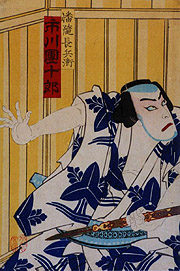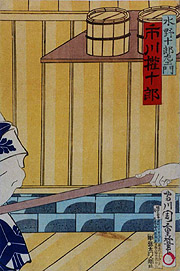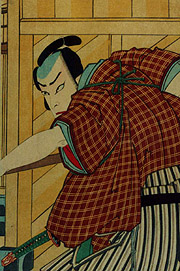| YUDONO NO CHÔBEI |
| Play title | Kiwametsuki Banzui Chôbê Yudono no Chôbê |
| Authors | Kawatake Shinshichi II (1881) Kawatake Shinshichi III (1891 revision) |
| History |
The drama "Kiwametsuki Banzui Chôbê" was premiered in October 1881 at the Harukiza [casting]. It was revised by Kawatake Shinshichi III in 1891. |
| Structure |
The drama "Kiwametsuki Banzui Chôbê" is made up of 4 acts. |
| Key words | Sewamono Otokodate Banzui-chôbeimono |
| Summary |
The play deals with the topic of chivalrous commoners but is presented in a more realistic style than many earlier plays and can therefore be seen as a product of Meiji Period "enlightenment". The story could be summed up by calling it "the last days of Banzui Chôbê", (the chivalrous commoner in question), and the plot examines in critical fashion the strangle-hold that the corrupt samurai class had on society towards the end of the Edo Period. The first scene is particularly interesting not only in its physical presentation, in which the real Kabukiza auditorium becomes the interior of the play-house in which the action takes place, but also because of the juxtaposition of two different acting styles. It is a play within a play. We in the real audience actually make up the fictional audience in the story as we watch an old-style aragoto play enacted before us. The action is brought to a halt when a drunken man gets out of our audience onto the hanamichi and causes a disturbance. This brings out the theatre manager who tries to settle the matter, but fails. Then a samurai appears and argues on the side of the drunk and finally Banzui Chôbê steps up from the auditorium to confront the arrogant samurai. In contrast to the aragoto acting style, the performance now is very naturalistic, and Mokuami goes on to make fun of aragoto by showing that the actor playing the hero in the play on stage is in fact a coward in this "real" life. As the gallant hero of the populace, Chôbê naturally wins the day, but just as he is about to return to his seat the blinds are drawn up on the far left of the stage to reveal lord Mizuno Jûrôzaemon, also supposedly watching the play from a private box. Both the drunk and the arrogant samurai are working for him and this public defeat by a mere commoner has humiliated him. Lord Mizuno has despised Chôbê for some time, regarding him as a lowly upstart who constantly challenges Mizuno's absolute authority, and this latest quarrel at last gives him an opportunity for revenge. What follows is inevitable. On the pretext of inviting Chôbê to a party to view the flowering wisteria in his garden, Mizuno intends to ambush and kill him. This Chôbê fully realizes. He knows that he'll be greatly outnumbered and will therefore lose his life, and yet his honour will not permit him to refuse the invitation nor to allow his own men to accompany him. That Chôbê would sacrifice even his life for his high ideals shows that he is good, and that Mizuno would stoop to ambushing an unarmed guest in his own mansion shows that he is bad. Chôbê bids farewell to his wife and son and goes off to meet his fate. Text courtesy of Paul M. Griffith |
 |
 |
 |
|
The actors Ichikawa Danjûrô IX and Ichikawa Gonjûrô playing the roles of Banzui Chôbê and Mizuno Jûrôzaemon in the drama "Kiwametsuki Banzui Chôbê", which was staged in October 1881 at the Harukiza (print made by Morikawa Chikashige) |
||
|
|
| Contact | Main | Top | Updates | Actors | Plays | Playwrights | Programs | Links | FAQ | Glossary | Chronology | Illustrations | Prints | Characters | Derivatives | Theaters | Coming soon | News |